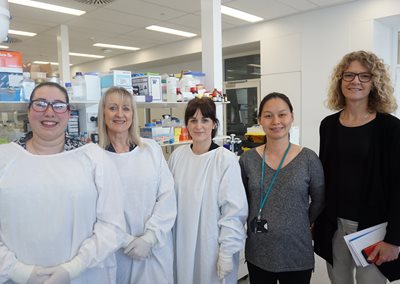August 9, 2019 Print
Research highlights progesterone’s effect in breast tissue
 Dr Dinny Graham (right) and members of the research team.
Dr Dinny Graham (right) and members of the research team.
Researchers from The Westmead Institute for Medical Research (WIMR) have identified the role of progesterone in the human breast, when the BRCA1 gene has been knocked down. This is an important step towards understanding how breast cancer develops in people with a mutation in the BRCA1 gene.
The BRCA1 gene plays a key role in tissue growth and DNA repair in human mammary tissue. Women with a mutation in the BRCA1 gene have a significantly higher lifetime risk of breast cancer compared to the rest of the population.
Although progesterone – a hormone involved in the growth of breast tissue during normal development – has been implicated in breast cancer, researchers do not fully understand the effects of progesterone in women with the BRCA1 mutation.
Using normal human mammary cells, the WIMR team knocked down the BRCA1 gene to replicate the impact of a BRCA1 mutation. They found that, in the absence of normal BRCA1 levels, progesterone causes human mammary cells to proliferate, or multiply rapidly.
Senior researcher, Dr Dinny Graham said, “In normal human breast tissue, BRCA1 has both a proliferative effect, and a protective effect as it can repair cells.
“In a study led by Dr Heidi Hilton, our research team found that in the absence of BRCA1, progesterone
 Dr Heidi Hilton led the study.
Dr Heidi Hilton led the study.
also has a proliferative effect. However, without BRCA1 to perform ‘safety checks’, cells with lesions and defects may be introduced to the breast.
“This can increase the likelihood of breast cancer developing.”
While lifestyle factors, such as being physically active, and limiting alcohol consumption can help reduce the risk, lifestyle factors alone are not enough to prevent breast cancer in women who have an increased genetic risk.
Dr Graham said, “It’s important that we develop preventative measures to reduce the risk of breast cancer in women with genetic risk factors, including the BRCA1 mutation.
“Now that we understand more about the role of progesterone in the absence of BRCA1, we can investigate how we can block progesterone function, potentially delaying or preventing the development of breast cancer.”
The paper was published in
The Journal of Mammary Gland Biology and Neoplasia: https://www.ncbi.nlm.nih.gov/pubmed/31104199
Dr Dinny Graham is associated with The Westmead Institute for Medical Research, The University of Sydney and Westmead Breast Cancer Institute, Westmead Hospital.